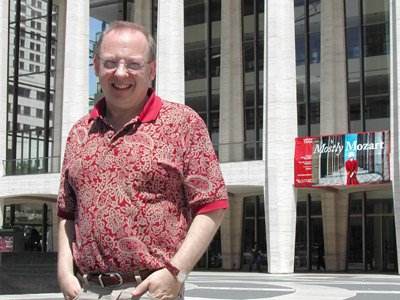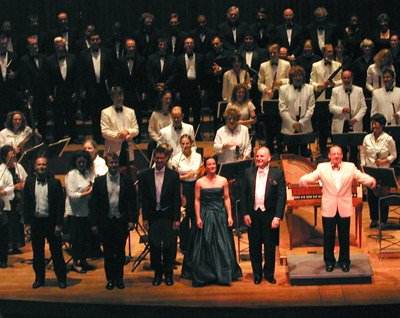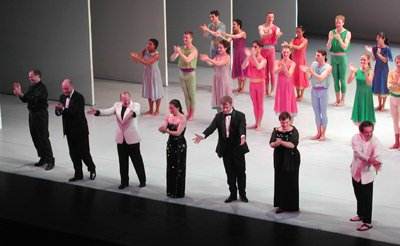S & H Interview
Nicholas McGegan interviewed by Melanie Eskenazi
Nicholas McGegan must surely be one of this country’s most remarkable musical exports to the U.S. – his stellar career has taken him all over the world, and he is internationally respected not only for his influential conducting of Handel but for the many musical enterprises with which he has distinguished involvement. He resides in Berkeley and is director of the San Francisco-based Philharmonia Orchestra, with whom he was visiting New York this season for the ‘Mostly Mozart’ festival, a festival initially dogged by controversy owing to the dispute between the organizers and the festival’s own orchestra; many events featuring that group having been cancelled, it was left to McGegan and a few others to ‘save’ the festival, a situation about which McGegan was characteristically direct when I spoke to him during a break in rehearsals at the Lincoln Center: ‘Here we have what is basically a British conductor, a British tenor leading, more or less carrying an American music festival – and do critics come over in droves and see that here in New York, the capital of the music world, it is full of Brits? Of course not!’ This critic, of course, had come over to do just that, and we were to return to this notion of insularity later on in our conversation.
These performances of Handel’s ‘Acis and Galatea’ and ‘L’Allegro’ were to be McGegan and his orchestra’s debut at the festival – ‘Don’t forget that the West Coast, from here, is as far away as London; if you have a period instrument orchestra from, say, Boston, it’s somehow in the neighbourhood, but we count as a European ensemble in terms of distance, but without the charm of the exotic! Of course, we have to get over that by being very good indeed, which is not a problem.’ Debut it might be, but McGegan has not only conducted both pieces many times, but worked with Mark Morris on ‘L’Allegro’ twice before: ‘We have played with the Mark Morris group more than any other orchestra, and working with Mark is basically just about as much fun as you can have legally and in public! He is the most musical of all choreographers, and what he does is the most marvellous translation into movement of words and music, so it’s a great treat to conduct it. In so many ballets one wonders why the music is not a tape, and one feels at times that one is a technical adjunct, like the lights, but in this, we all take part. It’s the same production as we did in London but it will always be slightly different because Mark allows his dancers to bring their own instincts to it, and that’s the great thing about them, they are not a Corps de Ballet, they don’t have the regulation height or amount of anorexia, so it’s not like buying a box of dolls.’
Acis and Galatea
The four evenings of ‘L’Allegro’ were to be preceded by a concert performance of ‘Acis and Galatea,’ a work for which McGegan clearly shares the present writer’s enthusiasm: ‘The music has such immediacy, and the text is wonderful, as well as the whole thing being so succinct, and so devoid of pomposity. It’s music of great joy, and it’s such a jolly pastoral despite the sadness – you get the feeling that these characters sit about and read ‘Hello’ all day, but the ending of it really touches your heart, because the death of Acis, although not tragic in the proper sense, is all the more touching because you’re at the demise of somebody you know rather than have read about, you actually feel the loss of this young shepherd.’ The work was to be given as a concert performance ‘…which is right, since it’s really a secular oratorio and Handel would have done it with a set but not fully staged, there being no such things as concert halls then – you did things either in churches or a theatre…’ and in English, even though the version used was Mozart’s, which is often performed in German: ‘I would do so if we were in Germany, but I can’t see the point here, since it needs to be comprehensible!’
McGegan described the timing of the performance – at 5.00 p.m. on the Sunday as ‘The Cocktail Time’ and enthused about the afternoon’s other work, the recently discovered cantata ‘Gloria’ to be sung by Dominique Labelle, making this a New York premiere. ‘Dominique is heaven, and John Mark (Ainsley) who is – well – just the Prince of English tenors, is singing Acis, so we’re really having a blast with it all.’ This enthusiasm was much in evidence at Friday’s rehearsal, where the atmosphere was so perfect a blend of hard work and fun; in 96F heat, and with the air conditioning having broken down, it was remarkable to see such ebullient direction and such committed playing from the orchestra. No detail was overlooked either by the leader or the conductor, and it was fascinating to hear some of the advice and comments given to both players and singers, such as ‘Yes, of course you play what’s written! The printed marks are the whole point of doing it like this! – then, to one of the soloists who sounded in danger of becoming a little inappropriate in style –‘ You don’t want too much vibrato, here; that may be the way you do it, but we’re 18th century here, not 19th century!’ and ‘Otherwise, we sound like a Catholic orchestra and Protestant singers!’ It was certainly an experience to listen to McGegan advising the very young tenor Michael Slattery (singing Damon) and the soprano Christine Brandes (Galatea) as well as to hear singers and orchestra performing with such unfettered joy; at one especially lovely moment, after Ainsley had sung a heart-stopping ‘Love in her Eyes,’ the singer said to the orchestra ‘Thank you – that was bliss…’ and McGegan’s response was characteristic – ‘I think that’s our line!’
Sunday’s performance lived up to expectations in every respect (the present writer’s review being ecstatic even by previous standards) and I expressed sadness that so few critics were present to hear it; ‘Well, I don’t see many British critics coming over here; maybe if they went a little outside Zone 6 occasionally we might get past this very deep provinciality, but of course less and less space is being given to classical music – you only have to look at the ‘Independent’ which has five pages of Pop and half a page of Classical in their Friday music section. We’ve quite a little Scottish mafia over in San Francisco, what with Runnicles, myself, Ian Robertson, but not many ‘home’ writers come over to see us, though I do recall Michael White and Hugh Canning having visited in the past. On the whole, I think we’re more interested in you than you are in us – just to give you an example, on CNN there was a whole segment given over to the big costume sale at Covent Garden, and I can’t imagine, say, ITN doing that for a similar event at, say, the Met.’
L’Allegro
McGegan is encouragingly positive about websites and online musical publications; ‘It is becoming totally international, and newspapers are painting themselves into a corner if they don’t go any further than Lewes, if readers can simply go online to find out what’s happening in Sydney! The web is going to take over, I think, and that’s no bad thing, since you do get so many knowledgeable people there, and they can of course write at length about the background and context of the music as well, rather than being confined to soundbites – it’s to the web that one now looks for the kind of wonderful stuff that Andrew Porter used to do when he wrote for the ‘New Yorker,’ and London could do with that. It’s a snobbery thing, of course, and one of the nicest things about being here is that levels of such things are lower – people pay to hear what they want to hear.’ Not that McGegan regards the London musical scene as dull; ‘The ROH has a truly wonderful orchestra and there is a lot going on there, but it’s so British to want to cut it down, to say it’s only for toffs! It would be nice if there were a smaller auditorium, say 1200 seats, for all the things for which the main house is too big, since the Linbury is rather, let’s just say, unalluring. I have to say that nowadays, that sort of repertoire gets done rather marvellously in places like the Royal College of Music! The Met here, of course, is built for ‘Aida’ and scenes between two people look a bit strange so they tend to fill the stage with chorus and pets.’
He also feels that there is a lack of exciting places in which to perform Handel in London, with the notable exceptions of Christ Church, Spitalfields, which he describes as ‘The most blessed venue, in terms of date, size, and with a totally unpretentious, unsnobby London town audience of which Handel would have been very proud. The Purcell Room is too small, the QEH too Soviet – you need to see the whites of the singers’ eyes! St. John’s in Smith Square is lovely but those places don’t have large amounts of funding to buy things in, and I hope that the London Handel Festival really takes off in a big way, since I think that Denys Darlow is a bit of an unsung hero.’
Darlow and McGegan have indeed been in the forefront of the Handel revival of recent years, something which the latter sees as a logical development of the growth in the number of singers who specialize in this area; ‘Of course it’s singer-led. There can’t be too many singers who don’t love singing Handel, since it’s great for the voice, showy in a way that’s comfortable to sing, and the roles are fantastic, especially for the women. They get the really big sings – the basses huff and puff, the counter-tenors are nobly heroic, the tenors sing mostly short but happy pieces, grateful not to have been castrated. The oratorios do also have the great advantage of being in English, and there isn’t all that much great music in English between Purcell and – oh, Gilbert and Sullivan. It’s easy to make Handel live for an audience – you just cast it with singers who can act and can improvise their own ornaments, and you employ a stage director who loves the works passionately, and last but not least a conductor who understands the dramatic potential of a da capo aria, which is no more stultifying than ‘Lucia,’ and usually a lot better written. It’s so easy to get the Handel bug – they’re just the best musicals ever written, and once you’ve got it you can’t get rid of it!’
Talk of opera production led us to discussion of styles of direction, about which McGegan is extremely forthright. ‘I have no objection to the kind of productions done by people like Sellars and the Aldens – people whose work is based upon a love of the music and the values it espouses. On the other hand, there are productions done by people who really should look for other work. It’s not a question of setting – I don’t care if it’s set on Mars, but what I’m talking about is the kind of director who really does not want the audience to be moved by the music, only astonished by what they see, and the moment the music becomes slow or moving, they do something to distract from it. I don’t always handle such situations with tact, since I cannot hide the fact that I despise such stage directors, but fortunately nowadays I often hire the director myself so I can avoid Eurotrash!’
McGegan spoke vividly about ‘the experience of being told ‘We’ve hired someone who has never done an opera before – won’t that be exciting?’ Well, no, it won’t, actually, because one will find oneself teaching a movie director that singers have to face the audience, or teaching a theatre director that the time is given to you by the composer and you can’t just suddenly speed up the aria because there are not enough words. Even very famous conductors have had to put up with that, and I can recall one director saying about an aria ‘Do we really have to have all that music before he sings?’ and another responding to my comment ‘The Italian word does not mean that’ by saying ‘It does now.’ That is a level at which I no longer work; opera should be done by professionals, it is an art form in its own right and deserves to be done by those who understand and respect it.’
His own opera plans include a ‘Hansel and Gretel,’ which he describes as ‘the best opera Wagner never wrote’ and which one might not expect a conductor best known for his Handel to do, but McGegan is very far from being a narrow specialist, loving such composers as Strauss and Britten almost as much as Handel; ‘It’s all music I like, and the only operas I really shy away from are the tubercular ones, since I like my sopranos to live, preferably happy ever after.’ A major event of the coming season is the Göttingen festival where he is Director, with a starrily cast ‘Jephtha’ the highlight in late May and early June; ‘I’m even doing it with the English Concert and the Choir of Winchester Cathedral – finally, with an all male choir as it is meant to be. It’s a shame that we are not doing it in London; you have to remember that Germany is about as far away as Bangladesh as far as some people’s imagination goes – it’s only 400 miles from London but it’s a whole world away in terms of co-operation.’
He expressed the wish for ‘Some kind of European Arts fund, so that something that began life at the Gulbenkian in Portugal could end up in Helsinki! But for now, such places as Göttingen’s perfect little theatre, with its 450 seat capacity and 60 feet deep stage, as well as the absolute charm of the town itself, must suffice. ‘Göttingen’s theme this time is the last works of Handel and the music at around the time of his death, so not only do I get to do a concert with John Mark and the English Concert, but Gustav Leonhardt and I are going to play the Concerto for harpsichord and piano of C.P.E. Bach, and that’s something which is making me nervous already.’
Asked to choose one of his many recordings in terms of his favourite and one which most readily springs to mind as suitable as introductions to his style, I was delighted that he selected my own favourite, the wonderful ‘Ariodante’ with Lorraine Hunt Lieberson in the title role. McGegan’s direction of such works, and indeed of the ‘Mostly Mozart’ performances of ‘Acis’ and ‘L’Allegro’ are typical of his style, which combines scholarly respect with a kind of infectious, ebullient espousal of the music in such a way that one sees and hears that both conductor and players actually enjoy what they are doing.
Melanie Eskenazi
Photographs © Marc Eskanazi



 Return to:
Return to: